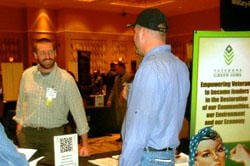You know the statistics. You know the national unemployment rate for post-9/11 military veterans is up to 9%, and upward of 30% for younger veterans -- far above the national average. You know that the number of military veterans leaving the service places increased demands on the workforce. But you also know that the skills, experience and leadership you acquired in the military prepared you for just about any challenge the workforce could possibly present.
The nonprofit organization Veterans Green Jobs is looking to help reverse the high unemployment trend and put veterans to work with a new program called Veterans Green Force. This is an outreach, recruitment and placement program exclusively designed for military veterans. It matches veterans' military experience and interests to the skills needed by green-sector employers, links them to training and educational programs, and connects them with available jobs.
The program's goal is to connect with 1,000 veterans through job fairs, networking events, military bases and other venues -- and place 30%, or 300, of them into full-time, green-sector jobs by mid-2013. The program will rely on strategic partnerships with private businesses, government agencies, nonprofit organizations, professional associations and higher education institutions that provide jobs and/or training programs to military veterans.
Veterans are well-suited for jobs in the green sector, a fast-growing and important sector of our economy. We define the "green" sector as energy efficiency and conservation; renewable and clean energy; green construction and building; natural resources and conservation; environmental remediation and response; and sustainable agriculture. These areas offer long-term economic, social and environmental benefits to the nation and our communities, and help the U.S. to achieve energy independence and security.
A big part of Veterans Green Force's task will be to help veterans make a successful transition into the workforce. With that in mind, here are some tips for veterans getting ready for the job hunt:
1. Widen Your Net
When deciding where to look for a job, be aware that the larger the geographic area you include in your search, the higher your chances are of finding work. The narrower your area, the fewer the opportunities. If you're willing to relocate, make this a conscious part of your job-hunting process.
2. Start Making Connections Now
Whether you're still in the military or already out, it's never too early to build your network of relationships. Go to job fairs and networking events; schedule coffee appointments with any and all professional contacts; create a profile on LinkedIn. Connections with other people open more doors than you can imagine, and for veterans transitioning out of the military and into the civilian workforce, the ability to meet people is critically important.
3. Tailor Your Resume
As soon as you decide to leave the military, start writing your resume. Use keywords that civilian employers care about and avoid non-military terms. (To help you translate your military resume into a civilian one, look for resume-writing classes and seek transition centers on post.) For every job opportunity you apply for, rewrite your resume and your cover letter to match the specific job.
4. Do Your Homework
Once you get an interview, prepare for it. Research the organization and develop your list of questions ahead of time. As Benjamin Franklin said, "By failing to prepare, you are preparing to fail."
While these steps won't guarantee you a job, they will steer you on the right course. But you'll need to be patient and flexible.
As a military veteran myself, and having been unemployed for six months, I understand the challenges of finding meaningful work. When I wrote my resume and sent it to a friend for editing, it came back completely marked up in red; I swallowed my pride and accepted the changes as constructive criticism. I also applied and interviewed for several jobs before I finally landed one.
And while I narrowed my search geographically, I cast a pretty wide net in terms of the job I was looking for: I knew I wanted to work for a mission-oriented organization that allowed me to continue my public service, but beyond that, it didn't matter much whether I worked for a nonprofit, a government organization or a private corporation.
If you don't yet know what you want to do, ask yourself, What do I like to do? What did I like to do in the military? And then, just start searching for jobs. See what pops out; see what excites you. And above all, be ready to make that shift from a military to a civilian culture. Just being aware that you'll need to adapt will help you prepare for the changes ahead.
Lt. Col. John Toth, U.S. Army (retired), is senior director of veterans programs at Veterans Green Jobs. A decorated airborne-Ranger infantry officer and combat veteran of Operation Iraqi Freedom, Toth recently completed his military career as professor of military science at the University of Colorado-Boulder. He brings a wealth of experience working with post-9/11 soldiers and cadets.
The Next Step: Find the Right Job
Whether you want to polish up your resume, find veteran job fairs in your area, or connect with employers looking to hire veterans, Military.com can help. Sign up for a free Military.com membership to have job postings, guides and advice, and more delivered directly to your inbox.











